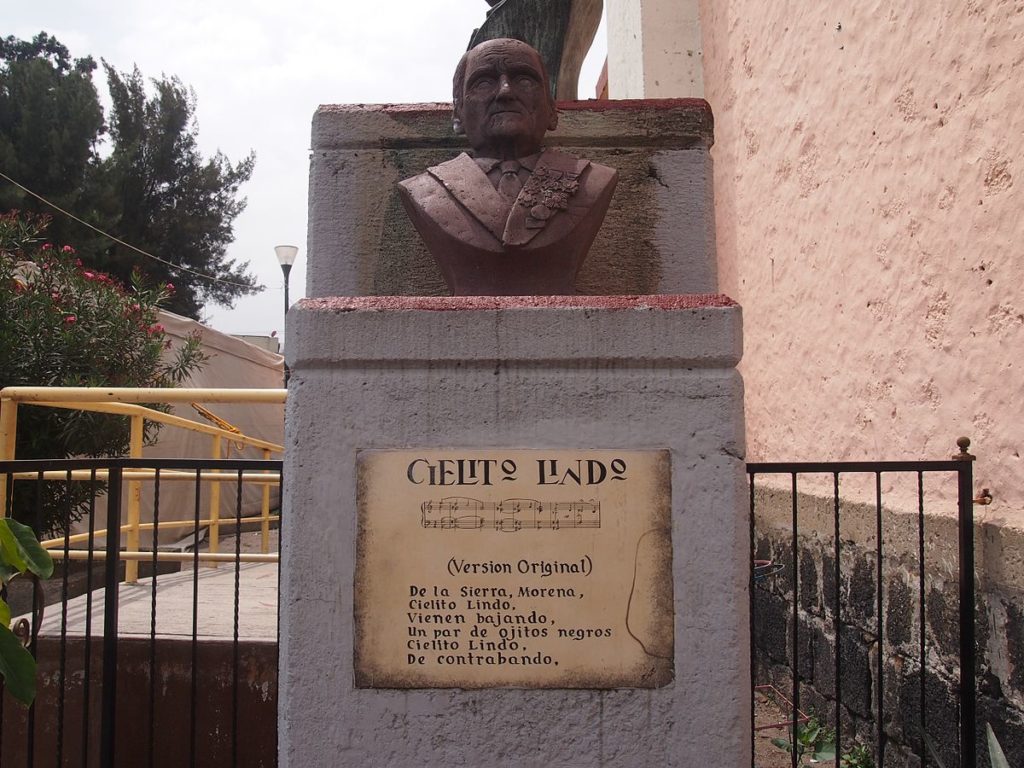
“Cielito Lindo”: A National Symbol of Mexico
By Fernando Acevedo
“Ay, ay, ay, ay
Canta y no llores
Porque cantando se alegran
Cielito lindo, los corazones”
Maybe you recognize these lyrics or have heard it before. These lyrics are from the famous Mexican song “Cielito Lindo,” originally by Quirino Mendoza y Cortés.
The song has become a trademark for Mexico as it has gained huge popularity since its conception in 1882. The song, which was dedicated to Quirino Mendoza y Cortés’ wife, Catalina Martínez, has been passed down to generations and now unifies Mexicans everywhere through its call for happiness exemplified in its lyrics which translate to, “Sing and don’t cry because singing gladdens the heart.” With the birthday of Quirino Mendoza y Cortés being May 10, members from the Stony Brook University staff and students said plenty about the significance of the song and what it makes them think about.

Statue of Quirino Mendoza y Cortés, composer of “Cielito Lindo,” in front of Palacio Municipal Tulyehualco in Mexico.
“Any kind of gathering would end with people singing that,” Director of Latin America and Caribbean Studies Eric Zolov, said. “It’s kind of classic. Often if you are eating out and the mariachis are playing at the next table, your table would join in. It evokes nationalism and community and solidarity with your fellow paisano who you don’t know, but you all know the same song. It’s a kind of a music nationalism there.”
“Cielito Lindo” has transcended past Mexico by gaining popularity throughout Latin America. For example, the song became politicized in Chile.
“In Chile ‘Cielito Lindo’ has this important political charge connected with the election of 1920,” Matías Hermosilla, a graduate student, said. “[Arturo Alessandri] used ‘Cielito Lindo’ as part of his idea of trying to connect with popular audiences.”
Alessandri was the first middle class candidate elected in Chile. Candidates were usually from the upper class of society, but he was a nontraditional candidate that represented the upper middle class as a college graduate and a lawyer.
His election “signified a huge change for the transition between a parliamentary system to a more presidential system that changed with the new constitution of 1925,” Hermosilla said.
The song has also branched out to those who were born and raised in the United States. Krislyn Rodríguez, the social chair of the Latin American Student Organization on campus, has Puerto Rican roots from her father. However, she wasn’t immersed into that Latino culture as much as she would have liked, but is nevertheless familiar with “Cielito Lindo.”
“I don’t remember exactly the last time or the first time I heard it, but even if it was on TV as a kid, I feel like it’s such a cultural staple song it would definitely be during a celebration of happiness, celebration, especially celebration of one’s culture,” Rodríguez said.
Mexicans volunteering in response to the 7.1 magnitude earthquake that struck central Mexico last September came together and sang “Cielito Lindo.” This solidarity and unification is exemplified through this scene of people coming together in the aftermath of such a tragedy through this song.
The song has become an overwhelming favorite chant sung in soccer stadiums by Mexico fans whenever the national team plays. Everyone who knows the words joins in and the sense of support behind the national team is palpable throughout the seats surrounding the pitch.
“Cielito Lindo” has become a song that has not only become an anthem for Mexicans everywhere, but a song that has escaped national borders. It’s a song that has gone as far as effecting a national election in distant country in South America.
“Canta y no llores” – sing and don’t cry. Those are certainly lyrics that Mexicans, Latin Americans, and those all around the world can connect to and even live by.

